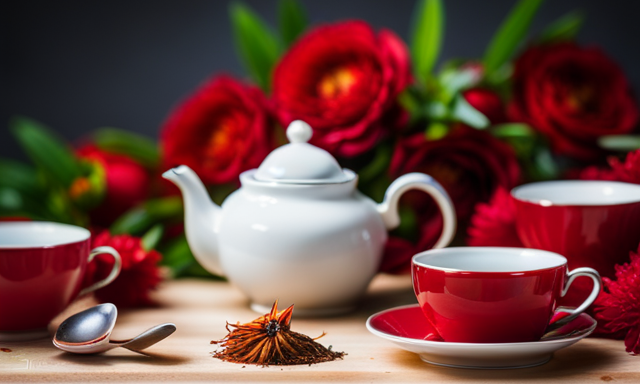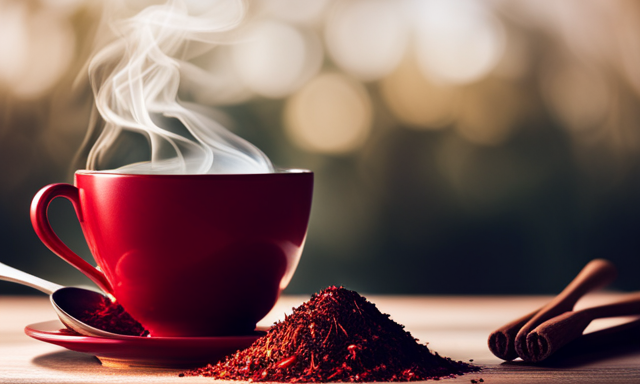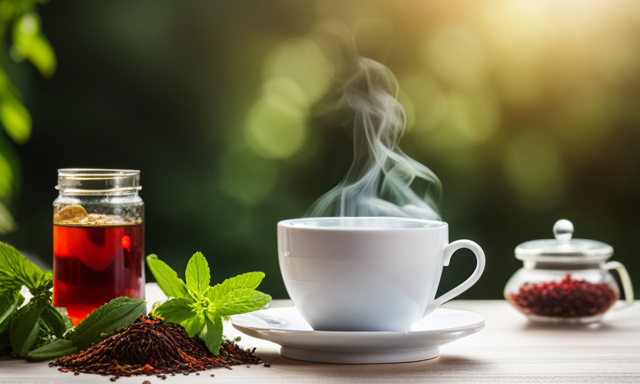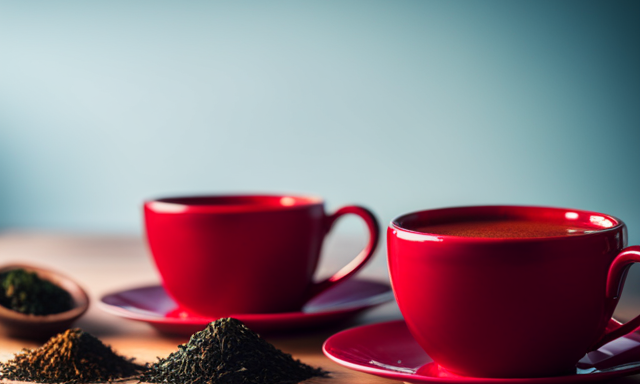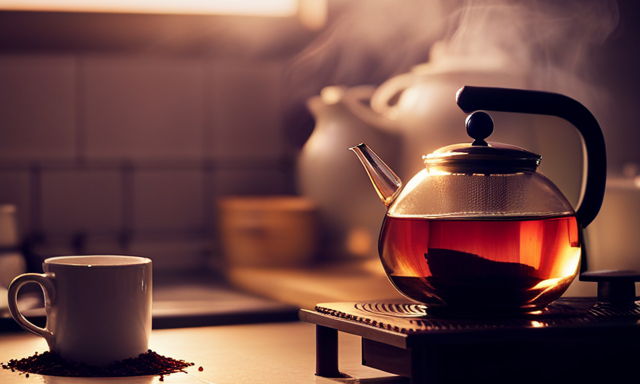Coincidentally, as I sat down to enjoy my daily cup of rooibos tea, I couldn’t help but wonder how many cups of this delightful beverage are recommended for optimal health benefits. After all, rooibos tea has gained quite a reputation for its numerous advantages, from its origins in South Africa to its rich nutritional content.
So, let’s delve into the world of rooibos tea and explore just how many cups we should be sipping on a daily basis. In this article, we will uncover the origins and benefits of rooibos tea, discuss the recommended daily intake, examine its nutritional content, and explore how it can aid in hydration, sleep quality, and digestive health.
Get ready to learn some brewing tips for that perfect cup of rooibos tea, and discover the variety of flavors and blends available. So, grab your favorite mug and let’s dive into the world of rooibos tea!
Key Takeaways
- Experts recommend 2-3 cups of rooibos tea per day for optimal health benefits.
- Rooibos tea is rich in antioxidants, which protect the body against free radicals and promote heart and skin health.
- Drinking rooibos tea can improve sleep quality by reducing anxiety and promoting relaxation.
- Rooibos tea supports digestive health by promoting the growth of beneficial gut bacteria and reducing inflammation in the digestive tract.
The Origins and Benefits of Rooibos Tea
If you’re looking to explore the origins and benefits of rooibos tea, you’ll be delighted to discover its fascinating story and the myriad of health advantages it offers.
Rooibos tea, also known as red bush tea, originated in the Cederberg region of South Africa. The indigenous Khoi-San people have been using it for centuries due to its healing properties. Today, rooibos is enjoyed worldwide for its unique taste and numerous health benefits.
One of the key health benefits of rooibos tea is its rich antioxidant content. Antioxidants help protect the body against free radicals, which can damage cells and contribute to aging and disease. Rooibos is also caffeine-free, making it a great choice for those looking to reduce their caffeine intake. Additionally, studies have shown that rooibos tea may help improve heart health, reduce inflammation, and support a healthy immune system.
Transitioning to the next section about the recommended daily intake of rooibos tea, it’s important to consider the optimal amount to enjoy its health benefits without overconsumption.
The Recommended Daily Intake of Rooibos Tea
When it comes to getting your daily fix of the beloved South African tea, experts recommend sticking to a moderate amount to reap its full benefits. The recommended daily intake of rooibos tea is about 2-3 cups per day. This amount provides enough of its powerful antioxidants and minerals to support your overall health.
To put it into perspective, here are four key reasons why sticking to this recommended daily intake is beneficial:
-
Boosts immune system: Rooibos tea is rich in antioxidants that help strengthen your immune system, protecting you from infections and diseases.
-
Promotes heart health: Regular consumption of rooibos tea has been linked to a lower risk of heart disease by improving blood pressure and reducing cholesterol levels.
-
Supports digestion: Rooibos tea aids in digestion, soothing stomach cramps and promoting a healthy gut.
-
Enhances skin health: The antioxidants in rooibos tea can help improve skin conditions like acne and eczema, giving you a glowing complexion.
With its numerous health benefits, it’s no wonder why rooibos tea is gaining popularity worldwide. Speaking of its nutritional content, let’s delve into the next section about the specific nutrients found in rooibos tea.
The Nutritional Content of Rooibos Tea
Let’s explore the nutritional goodness packed in a cup of delightful rooibos tea. Rooibos tea is not only a flavorful and refreshing beverage, but it also offers numerous nutritional benefits.
This caffeine-free tea is rich in antioxidants that help protect our cells from damage caused by harmful free radicals. It contains essential minerals like calcium, magnesium, and potassium, which are important for maintaining healthy bones and regulating blood pressure.
Rooibos tea is also known to have anti-inflammatory properties, which can help alleviate symptoms of conditions like arthritis. Moreover, it is low in tannins and free from oxalic acid, making it a safe and healthy choice for people with kidney stones or iron deficiency.
The health effects of rooibos tea extend beyond its nutritional content, making it a wonderful addition to a balanced diet.
Now, let’s explore how rooibos tea can help with hydration.
How Rooibos Tea Can Help with Hydration
To stay properly hydrated, you can enjoy a refreshing cup of rooibos tea. It replenishes your body’s fluids and can be a great alternative to sugary drinks like soda. For example, imagine coming home after a long, tiring day and sipping on a soothing cup of rooibos tea that quenches your thirst and leaves you feeling revitalized.
-
Rooibos tea for athletes:
Athletes often face dehydration due to intense workouts. Rooibos tea can provide them with hydration, electrolytes, and antioxidants to support their performance and recovery. Unlike sports drinks that are loaded with artificial additives, rooibos tea offers a natural and healthier option for athletes to stay hydrated. -
Rooibos tea and skin hydration:
Drinking rooibos tea can also benefit your skin. The antioxidants in rooibos tea help to improve skin hydration and combat free radicals, reducing the signs of aging. By incorporating rooibos tea into your daily routine, you can promote healthier, more hydrated skin from within.
Rooibos tea not only helps with hydration but also has other incredible benefits. It’s time to explore its impact on sleep quality.
The Impact of Rooibos Tea on Sleep Quality
Improve your sleep quality by incorporating the soothing effects of rooibos tea into your bedtime routine. Rooibos tea has been found to have a positive impact on sleep by reducing anxiety and promoting relaxation. The natural compounds in rooibos tea can help calm the mind and ease stress, making it an ideal choice for those struggling with sleep difficulties.
Additionally, research suggests that rooibos tea may also play a role in improving REM sleep, the stage of sleep associated with dreaming and cognitive function. By incorporating rooibos tea into your nightly routine, you can potentially experience a more restful and rejuvenating sleep.
In the next section, we will explore how rooibos tea serves as a source of antioxidants, providing numerous health benefits.
Rooibos Tea as a Source of Antioxidants
Indulge in the rich, copper-colored elixir of rooibos tea to unlock the hidden treasure trove of antioxidants that can fortify your body against the relentless march of oxidative stress. Rooibos tea is not only a delicious and soothing beverage, but it also offers a myriad of health benefits. Studies have shown that the antioxidants present in rooibos tea can have a positive impact on heart health, reducing the risk of cardiovascular diseases. Additionally, these antioxidants can also promote skin health by combating free radicals and reducing inflammation. To better understand the antioxidant content of rooibos tea, take a look at the table below:
| Antioxidant Type | Amount (per cup) |
|---|---|
| Aspalathin | 1.22 mg |
| Nothofagin | 0.95 mg |
| Quercetin | 0.23 mg |
With its impressive antioxidant profile, rooibos tea is a natural choice for those looking to enhance their heart and skin health. Moving forward, let’s delve into the role of rooibos tea in digestive health.
The Role of Rooibos Tea in Digestive Health
Rooibos tea’s potential benefits extend beyond heart and skin health. It also plays a significant role in improving digestive health. The effects of rooibos tea on gut bacteria have been studied extensively. It has been found to promote the growth of beneficial bacteria while inhibiting the growth of harmful ones. This can help maintain a healthy balance in the gut and support proper digestion.
Additionally, rooibos tea has anti-inflammatory properties that can help reduce inflammation in the digestive tract. This can alleviate symptoms such as bloating and discomfort. So, incorporating rooibos tea into your daily routine can have positive effects on your digestive system.
Now, let’s transition to the next section and explore some brewing tips for the perfect cup of rooibos tea.
Brewing Tips for the Perfect Cup of Rooibos Tea
To achieve the perfect cup of rooibos tea, follow these simple brewing tips:
-
Use freshly boiled water: Start by boiling water and then let it cool for a minute. Rooibos tea is delicate, and using water that is too hot can result in a bitter taste.
-
Steep for the right amount of time: Rooibos tea is forgiving when it comes to steeping time. However, for the best flavor, steep it for 5-7 minutes. This allows the flavors to fully develop and ensures a rich and aromatic cup.
-
Experiment with brewing techniques: Don’t be afraid to try different brewing methods, such as using a tea infuser or a French press. These techniques can enhance the flavor and make your cup of rooibos tea even more enjoyable.
When it comes to rooibos tea, there are endless flavor variations to explore. In the next section, we will dive into the exciting world of exploring different flavors and blends of rooibos tea.
Exploring Different Flavors and Blends of Rooibos Tea
Embark on a journey through the vibrant and diverse realm of rooibos tea and discover a world of delightful flavors and blends. Rooibos tea offers an array of flavors and blends that cater to every taste preference. From classic blends like vanilla and caramel to unique combinations like citrus and spice, there is something for everyone to enjoy.
The brewing techniques used to make rooibos tea also play a significant role in enhancing its flavors. Whether you prefer a strong and robust cup or a lighter, more delicate brew, experimenting with different brewing methods can unlock new depths of taste.
Explore the world of rooibos tea and discover the perfect blend and brewing technique that suits your palate. Transitioning into the next section, it’s important to enjoy rooibos tea in moderation to fully appreciate its delightful flavors.
Conclusion: Enjoying Rooibos Tea in Moderation
Indulge in the delightful flavors of rooibos tea while savoring every sip in moderation for a truly satisfying experience. Rooibos tea offers a wide range of flavors and blends to suit every palate. Its naturally sweet taste, combined with hints of vanilla, citrus, or spices, create a delightful and refreshing beverage.
However, it’s important to enjoy rooibos tea in moderation to fully appreciate its health benefits.
In moderation, rooibos tea can provide a soothing and calming effect, helping to reduce stress and promote relaxation. It is also rich in antioxidants, which can help boost the immune system and protect against cellular damage. Additionally, rooibos tea is caffeine-free, making it a great alternative to traditional teas or coffee.
When enjoying rooibos tea, remember to savor each cup and appreciate the unique flavors and aromas it offers. By drinking it in moderation, you can fully reap its health benefits and enjoy a truly satisfying experience.
Frequently Asked Questions
Can rooibos tea help with weight loss?
Rooibos tea can potentially aid in weight loss due to its numerous benefits. It is known to boost metabolism, which can help burn calories more efficiently. Incorporating rooibos tea into a balanced diet may support weight management goals.
Is rooibos tea safe for pregnant women?
Rooibos tea is safe for pregnant women to consume, offering numerous benefits. It aids in digestion, promotes relaxation, and boosts immune function. Additionally, it can be consumed during breastfeeding, providing a soothing and hydrating beverage for both mother and baby.
Can rooibos tea help with reducing stress and anxiety?
Rooibos tea can be beneficial for reducing stress and anxiety. Its soothing properties help relax the mind and body, promoting a sense of calm. Regular consumption can contribute to overall well-being and stress reduction.
Does rooibos tea contain caffeine?
Rooibos tea is naturally caffeine-free, making it a great alternative for those looking to reduce their caffeine intake. It is packed with health benefits, including antioxidants and anti-inflammatory properties.
Can rooibos tea help with managing blood sugar levels?
Rooibos tea, renowned for its soothing properties, can indeed assist in managing blood sugar levels. This herbal elixir aids in stabilizing glucose levels, making it a beneficial addition to a balanced diet.
Conclusion
In conclusion, I’ve discovered that enjoying Rooibos tea in moderation can be a beneficial addition to one’s daily routine. Its origins in South Africa and numerous health benefits make it a popular choice among tea enthusiasts.
For instance, I recently came across a case study where a regular Rooibos tea drinker reported improved digestion and better sleep quality. This example showcases the potential positive impact that this tea can have on overall well-being.
So, how many cups of Rooibos tea should you drink? Well, there is no one-size-fits-all answer to this question. It ultimately depends on your individual preferences and tolerance. However, most experts recommend consuming no more than 6 cups of Rooibos tea per day.
Remember, moderation is key when it comes to any beverage, including Rooibos tea. Too much of anything can have negative effects on your health. So, enjoy a cup or two of Rooibos tea each day and experience its delightful flavors and potential health benefits for yourself.

